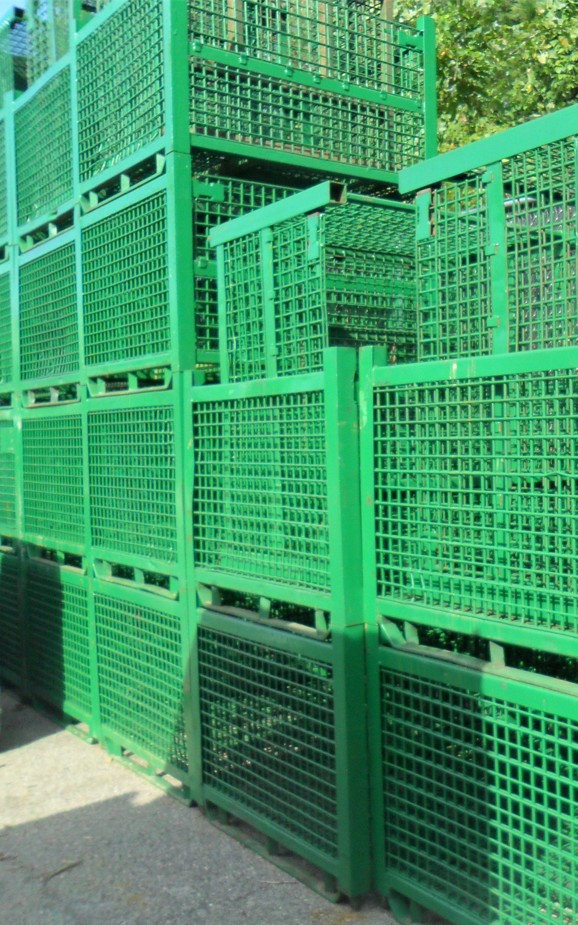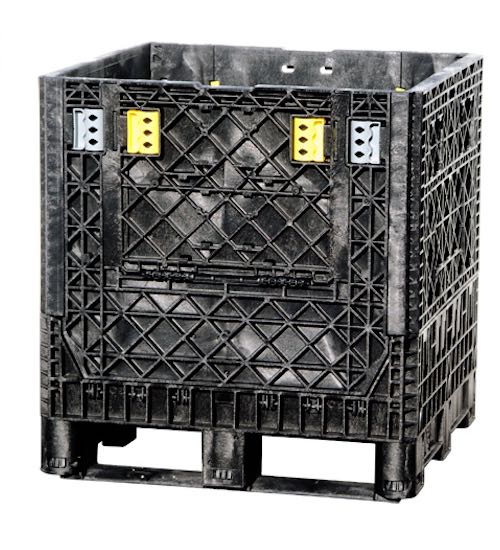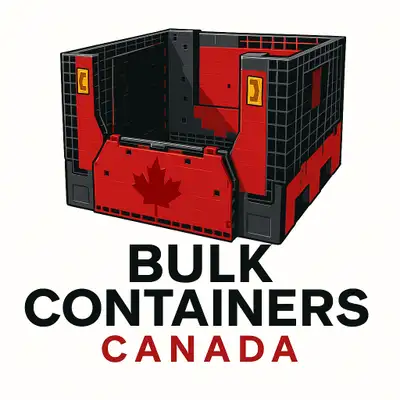Why Bulk Containers Are Necessary for Lasting and Cost-Effective Transportation
Bulk containers play a necessary function in contemporary logistics. They help with the efficient movement of big amounts of products, consequently enhancing transportation procedures. This approach not just lowers prices yet likewise reduces ecological influence via reduced emissions and waste generation. As industries seek more sustainable methods, the adoption of bulk containers is becoming increasingly significant. What implications does this change hold for future logistics and supply chain monitoring?

The Advantages of Using Bulk Containers in Logistics
Mass containers revolutionize logistics by improving performance and sustainability. These containers enable the transportation of big amounts of items in a solitary journey, considerably lowering the number of trips required. This not only streamlines operations however additionally decreases labor expenses associated with handling, loading, and discharging. On top of that, bulk containers are made to enhance space use within transport automobiles, ensuring that more products can be delivered at the same time.
The standardization of bulk containers likewise streamlines the logistics procedure. With consistent dimensions, they can be easily piled and saved, leading to improved warehouse management. Mass containers commonly feature resilient materials that protect materials from damages during transportation, consequently reducing item loss and boosting overall reliability. Therefore, organizations can experience improved supply chain performance, inevitably causing increased profitability and client complete satisfaction. This combination of aspects makes bulk containers a crucial possession in contemporary logistics.
Environmental Influence: Lowering Waste and Carbon Footprint
As sectors progressively prioritize sustainability, the fostering of bulk containers has actually arised as a crucial strategy for reducing waste and reducing carbon footprints. These containers lessen the usage of product packaging materials, such as boxes and plastic, therefore notably reducing general waste generation. By settling shipments, mass containers enhance transportation efficiency, permitting for more products to be transferred per journey. This decrease in journeys directly associates with lower greenhouse gas exhausts, contributing to a smaller sized carbon footprint.
Mass containers can commonly be reused or recycled, further minimizing environmental influence. The toughness of these containers guarantees they can hold up against several transportation cycles, reducing the requirement for single-use choices. refurbished bulk containers. By enhancing logistics and advertising efficient resource usage, bulk containers not only support lasting methods but likewise motivate markets to straighten with international ecological objectives. Inevitably, their application mirrors a dedication to ecological stewardship and responsible resource administration
Expense Cost Savings: Exactly How Bulk Containers Lower Transportation Expenses
While many companies seek means to boost their lower line, the usage of bulk containers presents a considerable chance for reducing transport costs. Mass containers maximize the quantity of items transported, permitting organizations to deliver larger quantities at the same time. This performance lowers the number of journeys needed, directly lowering gas costs and reducing labor expenses connected with loading and unloading.
In addition, mass containers typically feature structured styles that maximize area usage within transportation lorries. This implies less voids, causing more efficient use readily available capability. Furthermore, the sturdiness of bulk containers can reduce the risk of item damages throughout transit, lowering losses and making certain that more items show up undamaged.
Enhancing Supply Chain Effectiveness With Bulk Storage Space Solutions
Mass storage space solutions play an essential role in boosting supply chain performance by enhancing supply management. By combining goods right into fewer, larger containers, organizations can considerably lower handling expenses related to frequent transfers and handling. This streamlined method enables for far better tracking and administration of stock, inevitably resulting in improved operational efficiency.
Structured Supply Administration
Efficient inventory administration is necessary for enhancing supply chain procedures, specifically when companies adopt bulk storage options. These options allow businesses to maintain higher supply degrees while lessening the frequency of replenishment. By combining materials right into bulk containers, firms can improve their inventory procedures, lowering the intricacy connected with tracking multiple smaller sized packages. This technique assists in accurate supply matters and enhances projecting accuracy, permitting more educated decision-making. In enhancement, mass storage space solutions simplify warehouse company, making it easier to situate and accessibility items when required. Because of this, organizations can accomplish an extra effective stock turn over price, ultimately enhancing overall supply chain efficiency and minimizing the chance of stockouts or overstock circumstances.

Reduced Handling Expenses
The implementation of mass storage services not only simplifies stock administration but also considerably minimizes dealing with costs throughout the supply chain. By combining materials right into bulk containers, companies lessen the requirement for frequent handling and transfer in between different storage space and transport systems. This approach reduces labor expenses related to loading, unloading, and moving smaller packages. Additionally, bulk storage decreases the regularity of deliveries, resulting in reduced transport expenses and reduced gas usage. Consequently, organizations can enhance their logistics operations, allowing for an extra reliable allocation of resources. Inevitably, decreased managing costs contribute to boosted total supply chain efficiency, promoting a setting that sustains both sustainability and economic stability.

Adaptability of Bulk Containers Throughout Various Industries
Lots of industries have distinctive needs for transportation and storage, bulk containers have actually emerged as a functional remedy that fulfills a broad array of demands. These containers, varying from big bins to specialized containers, can suit diverse products, consisting of powders, granules, and fluids. In the agricultural market, bulk containers promote the transport of fertilizers and grains, while the food and beverage sector uses them for active ingredients and finished products. The chemical sector counts on bulk containers for safely transferring hazardous products, ensuring compliance with safety guidelines. Furthermore, building companies profit from bulk containers for transporting aggregates and other materials. Their flexibility includes numerous modes of transportation, including ships, trains, and vehicles, enhancing logistical efficiency. This convenience not just enhances operations across various fields but also advertises sustainability by decreasing product packaging waste and optimizing space en route. Mass containers play a crucial function in modern supply chain monitoring.
Future Patterns in Bulk Container Usage and Sustainability
The future of mass container usage is progressively shaped by cutting-edge materials growth that enhances sustainability. In addition, automation in logistics assures to enhance procedures, decreasing waste and improving effectiveness. Embracing circular economic climate practices will certainly better reinvent exactly how bulk containers are made, used, and recycled, promoting a more lasting transportation landscape.
Ingenious Products Growth
As markets significantly prioritize sustainability, cutting-edge materials development in bulk containers becomes a significant consider enhancing green transport remedies. Manufacturers and researchers are discovering eco-friendly plastics, recycled compounds, and light-weight metals to reduce environmental impact. These materials not only lessen waste yet additionally boost fuel effectiveness by decreasing the total weight of containers. In addition, advancements in clever products, which can adjust to differing conditions, enhance the sturdiness and performance of bulk containers. The assimilation of these cutting-edge products aligns with round economic climate concepts, promoting reuse and recycling. As the need for lasting methods grows, the growth of such materials will certainly play an important duty fit the future of mass container usage in logistics and transportation.
Automation in Logistics
Significant innovations in automation are poised to change logistics and the utilization of mass containers, boosting sustainability in transport. Automated systems, including drones and self-governing automobiles, are improving the activity of mass containers, lowering the reliance on standard fuel-powered transport. These technologies enhance directing and loading procedures, minimizing empty miles and boosting fuel efficiency. Additionally, automated inventory administration systems improve tracking and monitoring of bulk containers, making certain far better source allocation and decreased waste. The assimilation of the Net of Things (IoT) permits real-time data evaluation, making it possible for aggressive get more info decision-making that lines up with sustainability objectives. As automation remains to develop, it is anticipated to drive further innovations wholesale container usage, ultimately supporting more sustainable logistics methods and decreasing the ecological influence of transportation.
Round Economic Situation Practices
Innovations in automation are setting the phase for a much more integrated method to circular economic situation methods in the domain of mass container usage. As industries significantly accept sustainability, mass containers are being developed for long life and reusability. This shift not only decreases waste however likewise improves source efficiency. Business are adopting approaches such as closed-loop systems, where made use of containers are collected, refurbished, and reestablished right into the supply chain. Additionally, smart technologies track container life process, helping with much better management and decreasing environmental influence. The cooperation between suppliers, logistics carriers, and end-users is crucial in developing criteria for sustainable container usage. refurbished bulk containers. Future fads suggest an expanding emphasis on products that are recyclable and biodegradable, more enhancing the round economic climate's concepts in mass transport

Frequently Asked Concerns
What Materials Are Bulk Containers Normally Made From?
Mass containers are commonly constructed from durable products such as high-density polyethylene, cardboard, aluminum, and steel. These materials provide flexibility, defense, and toughness, making them suitable for moving various items in different sectors successfully.
How Do I Pick the Right Dimension Bulk Container?
Picking the right size bulk container involves examining the quantity of products to be moved, thinking about handling equipment compatibility, and evaluating storage room requirements. Correct dimension warranties performance in transport and reduces waste throughout shipment.
Are Mass Containers Reusable or Recyclable?
Mass containers are commonly reusable, made for numerous journeys, boosting sustainability. Several can additionally be reused, depending on the products used. Choosing recyclable alternatives better minimizes and supports ecological objectives waste in transportation techniques.
What Security Regulations Apply to Mass Container Transportation?
Safety and security regulations for bulk container transportation consist of compliance with the Division of Transportation guidelines, proper labeling of unsafe materials, architectural stability analyses, and adherence to weight limits to guarantee risk-free handling and prevent mishaps throughout transportation.
Exactly How Can Businesses Shift to Utilizing Mass Containers Effectively?
Organizations can transform to bulk containers by evaluating present logistics, educating team on handling, purchasing ideal devices, enhancing supply administration, and working together with suppliers to guarantee compatibility and effectiveness throughout the supply chain.
As markets increasingly focus on sustainability, the fostering of bulk containers has actually emerged as a crucial approach for lowering waste and reducing carbon impacts. By consolidating products into mass containers, companies can streamline their stock processes, reducing the intricacy connected with tracking several smaller packages. As industries significantly focus on sustainability, cutting-edge products development in mass containers arises as a considerable factor in enhancing eco-friendly transportation options. Automated systems, consisting of drones and self-governing automobiles, are simplifying the motion of bulk containers, minimizing the dependence on traditional fuel-powered transportation. Additionally, automated stock management systems enhance monitoring and monitoring of bulk containers, making sure much better source allowance and lowered waste.